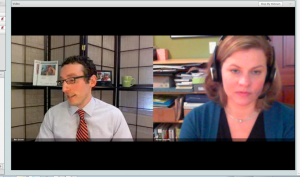Carena's CEO Ralph Derrickson says this kind of service is driven by several factors, not the least of which is technological advancement which permits secure video conferencing. But Derrickson also points out that the prevalence of high-deductible health plans, sometimes $5,000, makes a service like CareSimple appealing financially.
"The way health care is getting paid for is changing," Derrickson says. "The reality is that what used to be a $25 co-pay, in 2013 is becoming a $250 encounter. … We’re less expensive and done on your terms.”
And a visit to the ER can easily run over $1,000, which Derrickson says CareSimple can help clients avoid. If not, and a CareSimple doctor or nurse needs to refer you to the ER, then there's no charge for the CareSimple visit.
Dr. Sophia Chang is skeptical. She's with the California HealthCare Foundation and a practicing internist at San Francisco General Hospital. She wondered if this was a higher cost version of the nurse advice line and fretted about continuity of care, something which is already a challenge in American medicine.
"It’s great to be able to answer primary style medical questions quickly at the convenience of the consumer," Chang says. "The problem is that when it may be something that requires more than simple triage. There’s no mechnamism to link this to any testing. It’s all phone interaction or video interaction."
Derrickson and Green say the company's statistics show that more than 80 percent of the time, they are able to resolve a visit with advice or prescription.
Green says the company has been in business for several years in Washington state, and they've learned well what they can and cannot manage. "We’ve developed skills, we’ve developed clinical protocols," he says. "Our providers are a local group that we train independently here, and we focus on all the conditions that we are safely and effectively going to manage."
He specifies sinus infections, urinary tract infections, stomach viruses, flu and rashes, as common conditions CareSimple doctors can safely manage.
They say all the doctors with the service are board certified, and their patient satisfaction rates in Washington have been greater than 95 percent.
